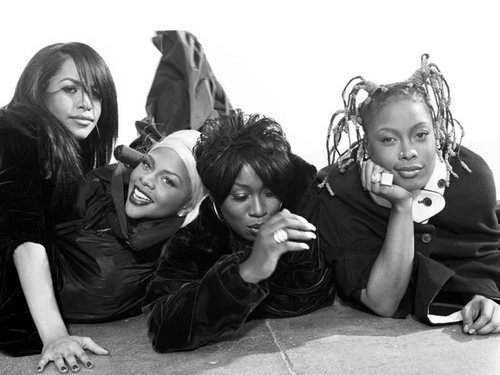It’s not that female rappers ever left us, it’s just that everyone else stopped paying attention. See, I have this weird fantasy where it’s the 90s again, and I’m kicking it on a stoop with my girl gang and a boom box. In this fantasy, someone just made a mix tape, and now we’re bumping to the likes of Missy, Lauryn, Queen Latifah, MC Lyte, Lil Kim and maybe some Salt-N-Pepa. But this isn’t actually what the 90s were like for me. I spent most of the 90s on playgrounds, because I was in elementary school. And yet there’s this weird pang of nostalgia for this phenomenon I never actually experienced, when female rappers took the mic and took the spotlight without depending on rolling with the boys to find exposure. They came out with the same bombast and braggadocio as their male counterparts, but they had one advantage: no matter how much the men could brag and rap about their bitches and hoes, they would never know what it was like to be a woman.

Unsurprisingly, it turns out the that nostalgia was not mine alone, and that, actually, a whole generation of women had been awaiting the return of the female emcee. Enter Azealia Banks: a New York girl with serious Harlem swag, who at 20 years old is the newest person to join the club of women who make me wonder what I’ve done with my life so far. Her talent is what’s going to blow her up, but her age tells a whole new story about a generation gap in hip hop, where the Female Emcee has been lying dormant for a decade, waiting anxiously to be awoken.
Banks, whose debut single “212” exploded on YouTube, now surpassing 4 million views, is part of a generation of women who grew up knowing that visibility was possible. They’re taking what they saw and creating their own meaning, re-shaping and re-interpreting that which came before them. These women are now coming into their own, creating their own music, and getting attention for it, and Azealia Banks is the perfect emcee to usher in the movement.
Hearing her lyrics, watching her videos and reading her interviews make it clear that Azealia (formerly known as Miss Bank$) has what it takes to deftly and effortlessly embody what it means to be an outspoken woman and a pack leader in 2012. She’s vulgar but articulate, sexy but not sexualized; she’s smart, aggressive, ambitious, sassy and a little rude, carrying it all with the sense of humor that keeps us alive.
And if she doesn’t already sound relevant to your interests, check out her Diplo-produced track, “Seventeen,” in which she raps over a sample of Ladytron’s track of the same name. She also contributed vocals to “Shady Love” by the Scissor Sisters and has a collaboration with Lana del Rey in the works, which will probably be crafted to make our hearts and minds explode.
Banks’ commentary often verges on the theatrical, a trait that she refers to as “kinda, like, obvious,” potentially owing to her former drama student status at Laguardia High School for the Performing Arts. The school also happens to be the alma mater of actor Adrien Brody, spurring an endless litany of comparisons between the two. (Just kidding.) Nicki Minaj also went there, but she and Banks are so different in style and flavor that it’s ridiculous and maybe even a little offensive to be constantly comparing the two. She’s not Nicki Minaj any more than she is Adrien Brody, and she’s becoming famous just by being herself: an anti-glamour loudmouth chasing big-time success without mercy or apology, because, let’s face it, who has time to apologize when you’re becoming famous this fucking fast?
Success is shaping up to be a strange but interesting picture for Banks, and maybe that’s because we’re not really sure what success looks like for a young female rapper in 2012. But whatever it looks or sounds like, the name she builds will hopefully be more than just a credit to herself, it will be a paved road down which future female rappers may stomp, holding their boom boxes high.









